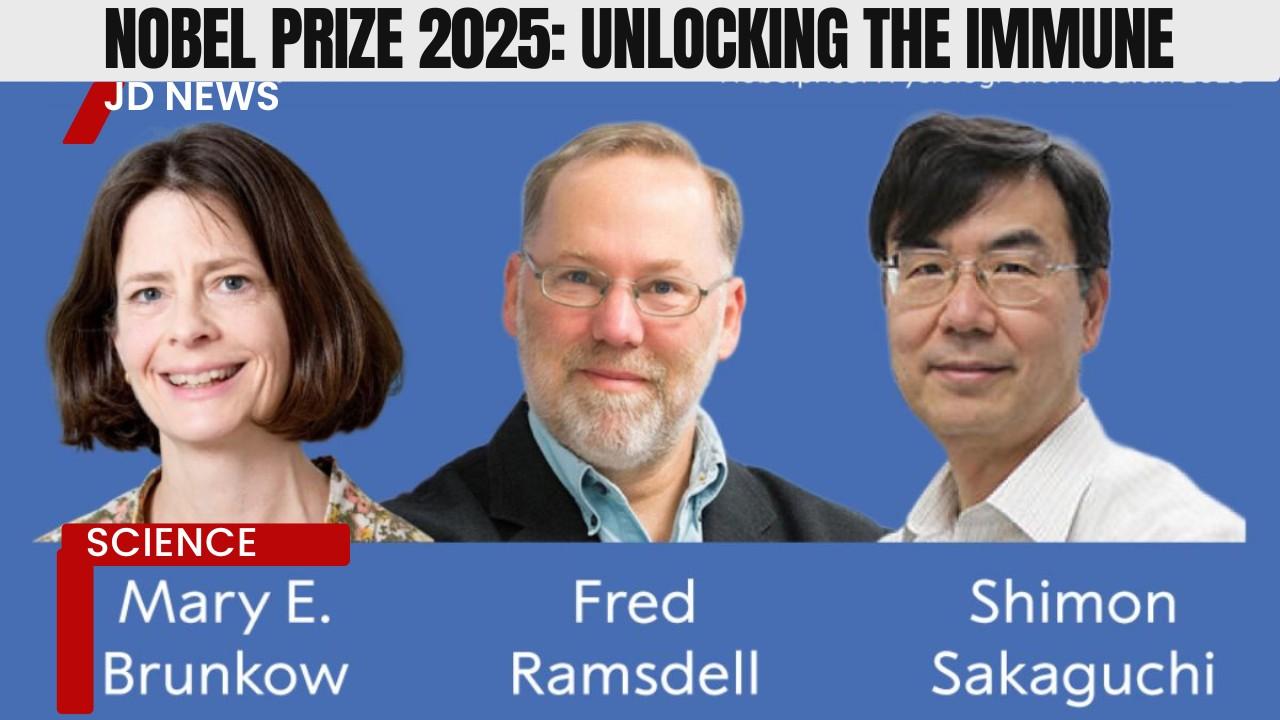Nobel Prize for Medicine 2025: Scientists Reveal Why the Immune System Doesn’t Attack Its Own Body

The 2025 Nobel Prize in Physiology or Medicine has gone to Japanese scientist Shimon Sakaguchi and American researchers Mary E. Brunkow and Frederick Ramsdell, whose groundbreaking work explained one of biology’s deepest mysteries — how the immune system protects us from disease without turning against the body itself. Their discovery of regulatory T cells (Tregs) and the FOXP3 gene has reshaped modern medicine, paving the way for advanced treatments for cancer, autoimmune diseases, and organ transplant rejection.
For decades, immunologists knew that the body eliminates harmful T cells during their development in the thymus, a process called central tolerance. Yet, this didn’t explain why some self-reactive immune cells still survived without causing disease. Sakaguchi challenged conventional wisdom in 1995 when he identified a new class of immune cells — regulatory T cells, often called the “immune police.” These cells suppress other T cells that mistakenly attack the body’s own tissues, establishing what became known as peripheral tolerance. His experiments on mice revealed that removing the thymus early in life triggered autoimmune reactions, proving that without these “police cells,” the immune system can spiral out of control.
At the same time, in the United States, Mary Brunkow and Frederick Ramsdell were investigating a mysterious strain of mice called “scurfy mice,” which suffered severe autoimmune disease and early death. After years of meticulous genetic mapping, they discovered that the mutation responsible lay in a gene they named FOXP3. This gene turned out to be the molecular switch that controls the development and function of Sakaguchi’s regulatory T cells. When FOXP3 is defective, these cells fail to form — leading to the immune system attacking its own tissues, as seen in both the scurfy mice and a rare human condition known as IPEX syndrome.
The combined discoveries of Sakaguchi, Brunkow, and Ramsdell not only solved a mystery that baffled scientists for decades but also revolutionized immunology and clinical medicine. Their findings have had direct implications for how doctors understand and treat disease. For instance, cancerous tumors often recruit large numbers of regulatory T cells to protect themselves from immune attack. This insight has become crucial for cancer immunotherapy, where scientists now design treatments that block or weaken these Tregs to help the immune system destroy tumor cells more effectively. On the other hand, in autoimmune disorders like type 1 diabetes or multiple sclerosis, researchers are exploring therapies that enhance regulatory T cells to calm an overactive immune system.
The Nobel Committee recognized that these discoveries have created a new medical frontier — one where immune balance can be engineered rather than merely observed. From CAR-T cell therapies for cancer to experimental Treg-based treatments for transplant patients, this scientific foundation is shaping a new generation of precision immunotherapies. As clinical trials advance, the challenge remains to fine-tune this delicate balance — boosting immunity when needed and restoring peace when it turns destructive.
The 2025 Nobel Prize for Medicine reminds the world that understanding our immune system is not just about fighting infections — it’s about understanding ourselves. By revealing how the body’s own defense learns restraint, Sakaguchi, Brunkow, and Ramsdell have not only rewritten immunology textbooks but also offered new hope for millions living with immune-related diseases.
These discoveries are not just academic. Understanding immune self-tolerance lays the foundation for new therapies in autoimmune disease, transplantation, and cancer immunotherapy. With T-regs as molecular “brakes,” researchers are now testing ways to boost them in diseases like lupus or type 1 diabetes, or conversely suppress them in cancer, where they can inhibit anti-tumor immunity.
Sources: This report is based on publicly available information and media reports from NBC News, CNN, BBC, The Hindu, and The Times of India
Disclaimer: The information provided in this blog is for general guidance only and is not intended to serve as medical or dietary advice. While the topic discussed is widely recognized for its scientific importance, individual health needs vary depending on factors such as medical history, age, lifestyle, and genetic profile. Before making any significant health-related decisions or changes based on scientific findings, we recommend consulting a qualified healthcare professional. The insights shared here are intended to inform and inspire but should not replace professional medical advice, diagnosis, or treatment.